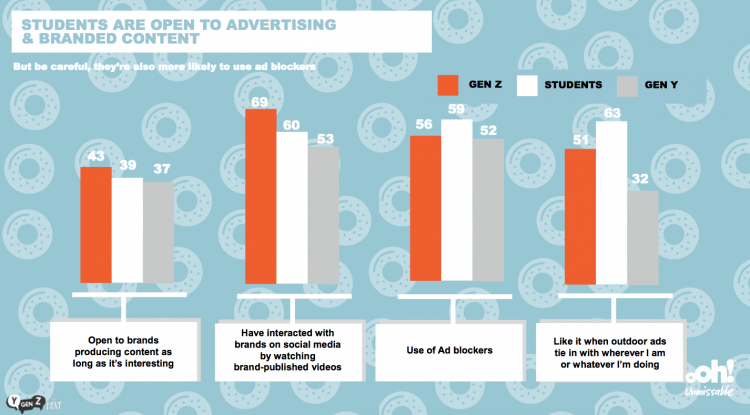The myths around buying habits of the often misunderstood Gen Z and the influence marketing has on them have been dispelled by a new, comprehensive study of young Australians conducted by oOh!media and it’s youth publishing platform Junkee Media.
By combining the new research report Y Gen Z are Next – an oOh! and Junkee Media’s report into Australia’s youth – with Quantium’s data, oOh! has found that young Australians have more disposable income and brand affinity than typically thought.
The two rich data sources also show that the hard to reach Gen Z market, in particular students, are willing to connect with brands and are positively influenced by marketing, particularly branded content via social channels and Out Of Home media. This generation are not saving for a house or a car, they are saving and spending on life experiences.
Y Gen Z are Next, launched by Junkee at the Millennial Marketing Conference in Melbourne, found:
- 82% of Gen Z’s get more local, national and international news from social media than newspapers and TV news programs
- Facebook is their main social media channel – 99% of Gen Z use it every day
- Snapchat is their second most used – 84% use it every day, with Instagram third at 79%
- 98% use their mobile phone to access news and entertainment content
- 78% have searched for information after seeing an OOH advert
- 14% of monthly income is saved for travel, while 8% of income is spent on fashion and 20% on events and entertainment
- 27% of students earn more than $30k per year
- 55% of full time students have a part time job, and 10% of part time students have full time jobs
- 40% rent a home, while 49% live at home (14% of those pay rent)
Using these insights and combining with Quantium data, shows that students:
- Like shopping for newer, modern brands with an online presence – 2.3x more likely to shop at Asos, 2.2x at UniQlo, and 1.9x at Zara.
- · Have a high affinity for budget-conscious travel brands like Hostel World (3.6x), Airbnb (1.7x), AirAsia (1.9x).
- Stick to their budgets by buying in bulk and there is a big opportunity for more established brands to engage with these audiences
Michaela Chan, CMO of oOh!media, said the insights gained from the Y Gen Z are Next study combined with Quantium data, equips advertisers with the critical insights they need to know to create deeper connections with this audiences.
“There used to be this perception that students don’t spend money and are immune to marketing messages, but our research shows they are receptive to brand messages, just not in traditional ways, and their buying habits show they simply don’t spend money the way young people did in the past.
“For example the study shows that they are more likely than other generation to engage with brands through social media, will consume branded content as long as it’s relevant and interesting and are engaged by Out Of Home advertising – with 78 per cent of them saying they’ve searched for more information online as a direct result of seeing an Out Of Home ad.
“Understanding the buying habits of young people, in this case students and using Quantium data, we can see that when compared to the average Australian, there’s higher levels of spend for certain brands, particularly those that offer experiences like travel, live sporting events and music and food festivals.
“They’re also big drivers of the access economy and have a much lower affinity for brands in the hardware and home decorating space.
“Due to the exclusive nature of the Quantium data coupled with the Y Gen Z are Next insights, oOh! are the only Out Of Home provider that can paint a really vivid picture of the spending habits of these young Australians and in turn, allows advertisers to understand this audience on a much deeper level than was previously possible.
The Y Gen Z are Next research is a collaboration between oOh! Locate’s Study offering, Junkee Media, and Pollinate Research. It is the largest research undertaking since oOh! acquired the Junkee Media business in 2016 and demonstrates oOh!’s strategy to become a new media player enabling marketers to engage with a broad range of audiences through a diverse range of platforms.











